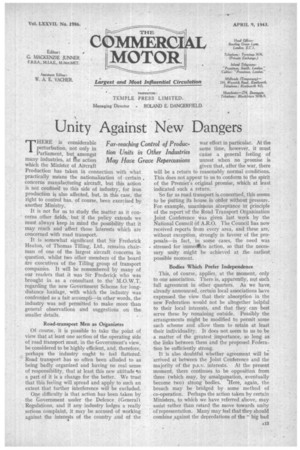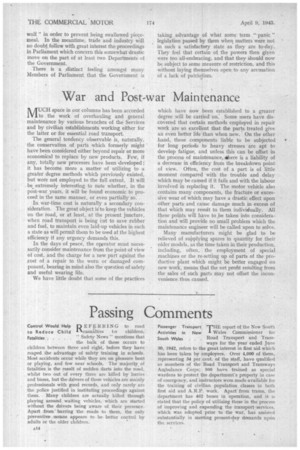Unity Against New Dangers
Page 15

Page 16

If you've noticed an error in this article please click here to report it so we can fix it.
THERE is considerable perturbation, not only in _ Parliament, but amongst many industries, at the action which the Minister of Aircraft Production has taken in connection with what practically means the nationalization of •certain concerns manufacturing aircraft, but this action is not confined to this side of industry, for iron production is also affected, but, in this case, the right to control has, of course, been exercised by another Ministry. It is not for us to study the matter as it con' cerns other fields, but if the policy extends we must always keep in mind the possibility that it may read and affect those interests which are concerned with road transport. It is somewhat significant that Sir Frederick Heaton, of Thomas Tilling, Ltd., remains chairman of one of the largest aircraft concerns in question, whilst two other members of the board dre executives of the Tilling group of transport companies. It will be remembered by many of our readers that it was Sir Frederiqc who was brought in as a consultant to the M.O.W.T. regarding the new Government Scheme for longdistance haulage, with which the industry was confronted as a fait accompli—in other words, the industry was not permitted to make more than general observations and suggestions on the smaller details.
Road-transport Men as Organizers Of course, it is possible to take the point of view that at least one section of the operating side of road transport must, in the Government's view, be considered to be highly efficient, and, therefore, perhaps the industry ought to feel flattered. Road transport .has so often been alluded to as being badly organized and having no real sense of responsibility, that at least this new attitude to a part of it is a change for the better. We trust that this feeling will spread and apply to such an extent that further interference will be excluded.
One difficulty is that action has been taken by the Government under the Defence (General), Regulations, and if any industry lodges a really serious complaint, it may be accused of working against the interqts of the country and of the war effort in particular. At the same time, however, it must cause a general feeling of unrest when no 'promise is given that, after the war, there will be a return to reasonably normal conditions. This does not appear to us to conform to the spirit of the Premiers original promise, which at least indicated such a return.
So far as road transport is concerned, this seems to be putting its house in order without pressure. For, example, unanimous acceptance inprinciple of the report of the Road Transport Organization Joint Conference was given last week by the National Council Of A.R.O. The Council has now received reports from every area, and these are, without exception, strongly in favour of the proposals—in fact, in some cases, the need was stressed for immedt.te action, so that the necessary unity might be achieved at the earliest possible moment.
Bodies Which Prefer Independence This, of course,. applies, at the moment, only to one association. There is, apparently, not such full agreement in other quarters. As we have already announced, certain local associations have expressed the view that their absorption in the new Federation would not be altogether helpful to their local interests, and that they can best serve these by remaining outside. Possibly the arrangements might be modified to permit some such scheme and allow them to retain at least their individuality. It does not seem to us to be a matter of the greatest importance, so long as the links between them and the proposed Federation be sufficiently strong.
It is also doubtful whether agreement will be 'arrived at between the Joint Conference and the majority of the p.s.v. interests. At the present moment, there continues to be opposition from three (which may, by amalgamation, eventually become two) strong bodies: `Here, again, the breach may be bridged by some method of co-operation. Perhaps the action taken by certain Ministers, to which we have referred above, may assist rather than retard the move towards unity of representation. Many may feel that they should combine against the depredations of the "big bad wolf "in order to prevent being swallowed piecemeal. In the meantime, trade and industry will no doubt follow with great interest the proceedings in Parliament which concern this somewhat drastic move on the part of at least two Departments of the Government.
There is a, distinct feeling amongst many Members of Parliament that the Government is
taking advantage of what some term "-panic" legislation passed by them when matters were not in such a satisfactory state as they are to-day. They feel that certain of the powers then given were too all-embracing, and that they should now be subject to some measure of restriction, and this without laying themselves open to any accusation of a lack of patriotism.




















































